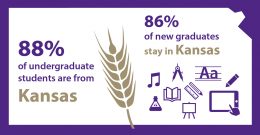Lori Goodson, Editor
Mary Hammel, Technical Editor
Category: January 2018
Join us for this Olathe event!
‘Tis the Season…for colds and flu
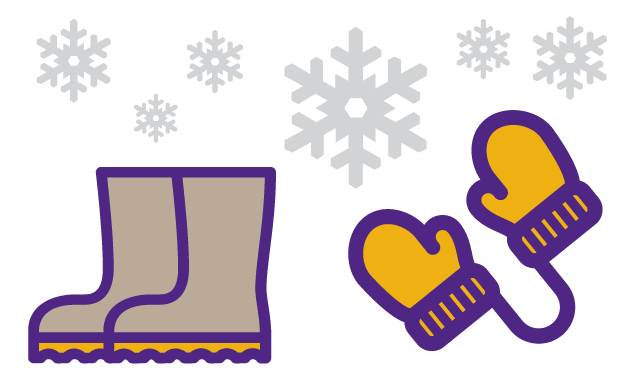 It’s official! Winter has arrived and will be sticking around for several more weeks! Here are a few suggestions to keep you warm, happy, and teaching through the winter months:
It’s official! Winter has arrived and will be sticking around for several more weeks! Here are a few suggestions to keep you warm, happy, and teaching through the winter months:
- It’s cold and flu season, so watch out for those germs! Use disinfectants on door knobs, often-used items around the room, and anti-bacterial lotion for your hands. Keep boxes of facial tissues on hand, as students will go through them quickly. (It might be a good time to request a few boxes from parents.)
- Messy weather also brings messy items into your classroom. You’ll have snow and slush tracked in, so be ready for spur-of-the-moment clean ups. Throw a few old towels and a roll of paper towels into your storage closet.
- Cold weather also means more winter coats, hats, mittens, and other gear to keep track of and store through the day, so develop a system that allows easy access for recess or at the end of the day, yet keeps them out of your day during class time. (Need some ideas on that? Check with your hallway neighbor to see what he or she does.)
- Allow extra time for bundling up younger students! Parents and guardians will appreciate that you spent that extra time making sure their children were protected as they head to a school bus or walk home.
- For your own well being, be sure to layer your clothing, since schools often can shift from too cold to too warm on a day-to-day basis. Store an extra sweater or jacket in a closet just in case.
- Allow yourself extra time to get to your school. Sacrificing a few extra minutes of a morning can save you time by helping you avoid a fender-bender…and a visit with the police…and a visit with your insurance agent…well, you get the idea.
Once you get your winter system in place, you can fine-tune it and slush through whatever winter has to offer!
In the Classroom: James (Austin) Smith
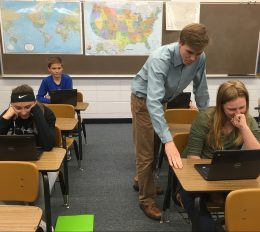
Name: James (Austin) Smith
School district: Riverton Middle School USD 404
City/State: Riverton, KS
Class/content area taught: 7th & 8th Grade Computer Applications and 8th Grade Personal Finance
What are you most excited about with your new career? It was exciting last year to finally, truly have my “own” classroom. This year I am excited to make some much needed adjustments and modifications to my lessons. I found out the hard way many days last year what did and did not work.
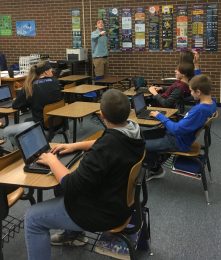
What you enjoy most about teaching: At the middle school level, I have thoroughly enjoyed listening to my students talk about their lives. Some of the stuff they say is quite comical, and it keeps the spontaneous factor very much alive.
In what ways has your school/district supported you? They invested pretty heavily in some workshops during my mentorship program, as well as sending me to some technology conferences. I really needed the latter, since technology was never really my content prior to this job. So this has helped me at least get up to speed with most of that component.
What are some specific things you believe KSU especially helped prepare you for your new career? I feel like the variety of classes that were at my disposal during the early field experience and block portions were critical. I was able to observe graphic design and digital media one semester because I had never taken those courses. They helped me realize very quickly that that was not my passion, but they each had some interesting features and benefits.
Are there specifics about your background that make teaching the perfect fit for you? I have some teachers and professors scattered throughout my family. I would say it was my background in a small family business that has helped me become a much stronger classroom manager. I have been able to witness many management styles. I thought I knew which one worked for me and my class. I learned quickly that I would have to adapt my style to the needs of my classroom. My time in that business helped me to make a smooth transition. Hopefully the students didn’t suffer too much from it!
Suggestions/encouragement for new teachers: Take it one day at a time, one lesson at a time. If you stick to that, the rest of it will manage itself. Above all, get as involved in your school and students’ lives as much as you can in your first year. It is not just a good thing, but necessary for yourself and for them to see,
Other thoughts? Teaching has really provided me with a unique experience in life that not many have to opportunity to share. Life after college has been good. I would strongly recommend networking as much as you can while you are in college so you have another support group outside to help you and to share resources and stories to learn and grow from. Keep in touch with the people you are going through the blocks or your classes right now. The more people and resources in your arsenal, the more opportunites you will provide for yourself later on down the road!

Your COE…by the numbers
Snow Days: Keeping Your Lessons Flexible
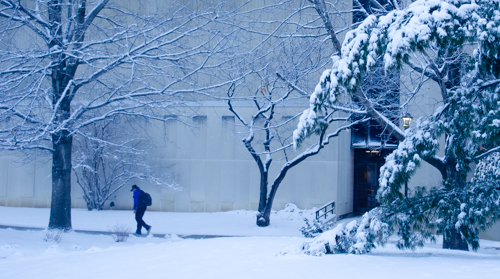
Snow days bring their share of questions and hassles, as students and adults alike are asking: Will school let out early because of the snow? Will we have school tomorrow? And, for you, the teacher, just how do you adjust your amazing lesson plans?
Keep these things in mind as you experience your first snow days:
- Be ready for interruptions. You may have more tardies and absences, since students may not be able to get to school on time. Understand that that is a possibility and know that you’ll probably need to help tardy students get back on track with the rest of the class.
- BE FLEXIBLE! Your daily calendar and lesson plans can fall victim to the weather. Remember that it’s truly no one’s fault (unless you want to blame yourself for not taking that teaching job in Hawaii). The calmer you deal with these changes, the calmer your students will respond, as well.
- Expect your students to be more excited and bubbly–as they wait to hear an early release announcement or as they come back to school after a snow day and want to discuss what they did on their day off. If it’s a real problem, alter your activities to include more desk work, which should keep your students a little calmer.
- Take advantage of the season, if possible. If your students are excited about the snow, try to alter your assignments to make the most of it. For English class, can you work in some winter poetry? Or snow images for art? How can you work in a brief study of weather in one of your classes? Check out this website: Snow Day Resources
- Have “extra” but meaningful assignments prepared to keep students focused. If they’re bubbling because of the weather, don’t be surprised if they fly through the regular activities and you need to supplement. Down time and snow days aren’t a good combination!
- Take a few minutes to simply enjoy the fun spirit that a new snowfall can create! You have a front-row ticket to possibly the best place there is to experience the world: Your classroom.
- And, finally, if and when you DO get a snow day, enjoy! Cozy up to a hot chocolate, a good book, or some binge-worthy TV time. Don’t let your students have ALL the fun.
Talk to me! I’m waiting for an update from YOU!
![]() We are waiting for an update from you!
We are waiting for an update from you!
Why don’t you send us a photo of you at work in your classroom! Or, do you have a question about classroom procedures? A suggestion for a topic we should address in Before the Bell? Want to add your name to our mailing list? Or provide a different email for our list?
Early-career teachers, feel free to jump in and offer suggestions to those who are following your career choice!
We’d love to hear from you, so please email us at lagoodson@k-state.edu.
Go, COE Cats!
#WeAreEdCats Has Resources to Help
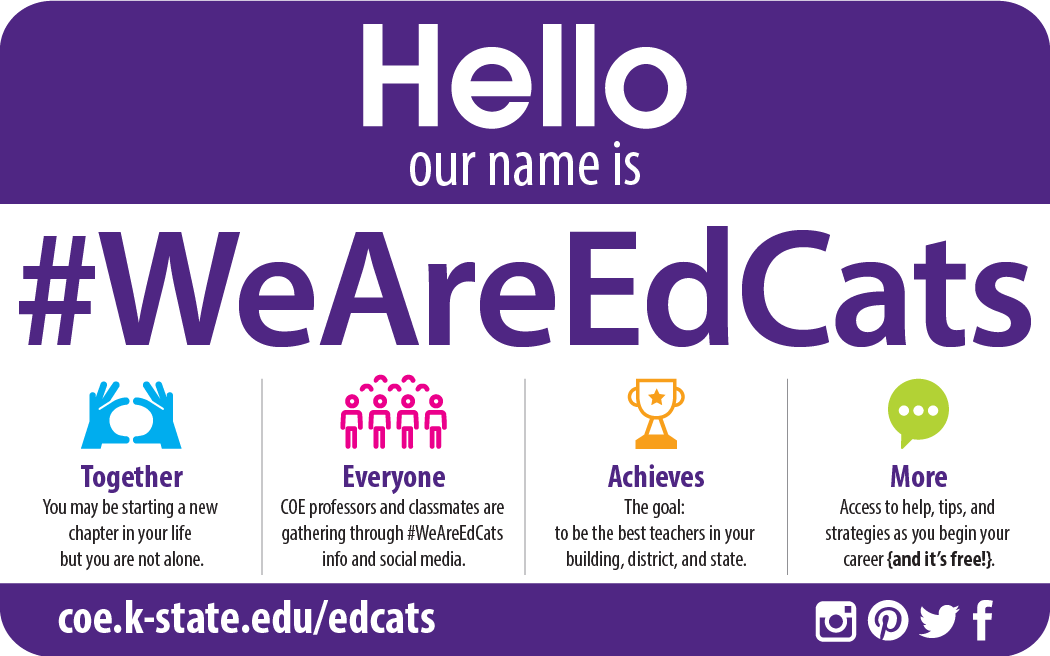 Have you checked this out yet?
Have you checked this out yet?
We want to help beginning and early career teachers like you thrive in your career! Check out #WeAreEdCats for teaching tips and to stay in touch with the COE! Check out the website at coe.k-state.edu/edcats.
A few words…websites…movies of advice
 Here are some books and other resources some of your former professors offer as ways to inspire you in your new career of teaching:
Here are some books and other resources some of your former professors offer as ways to inspire you in your new career of teaching:
Dr. Brad Burenheide (Secondary Social Studies)—
- First Days of School by Harry Wong and Rosemary Wong
- Meet Me in the Middle by Rick Wormeli
- Classroom Instruction That Works: Research-based Strategies for Increasing Student Achievement by Ceri B. Dean, Elizabeth Ross Hubbell, Howard Pitler, and BJ Stone.
Dr. Todd Goodson (Secondary English, Speech/Theatre, Journalism)—“Let’s try three great school movies:
- Dead Poets Society (1989)
- Mr. Holland’s Opus (1996), and
- Stand and Deliver (1988)
- For extra credit, try Goodbye, Mr. Chips (1939).
- For comic relief at the end of the school year, try Teachers (1984).
Dr. Lori Levin (Literacy)—
- “Bookmark the ALA website and keep current on the latest award winners – http://www.ala.org/alsc/2017-alsc-book-media-award-winners
- Visit NEA for a list of must reads for new teachers: http://www.nea.org/home/34033.htm
- Great Websites for Kids from the American Library Association – http://gws.ala.org/
Ms. Cyndi Kuhn (Technology)—
- Teach like a Pirate by David Burgess
- Ditch that Textbook by Matt Miller
- Good to Great by Jim Collins
Dr. Sherri Martinie (Secondary Math)—
- The Courage to Teach by Parker Palmer
- Teaching with Love and Logic by Jim Fay and David Funk
- Mindset: The New Psychology of Success by Carol Dweck
Dr. Tom Vontz (Elementary Social Studies)—
Dr. Vicki Sherbert (Secondary English/Language Arts, Speech/Theatre, Journalism)—
- Kittle, P. (2013). Book love: Developing depth, stamina, and passion in adolescent readers. Portsmouth, NH: Heinemann.
- National Writing Project & Nagin, C. (2006). Because writing matters: Improving student writing in our schools. San Francisco, CA: Josey-Bass.
- Graves, D. (2006). A sea of faces: The importance of knowing your students. Portsmouth, NH: Heinemann.
- Ripple Maker by Davis Laughlin
- In Defense of Read-Aloud: Sustaining Best Practice by Steven Layne
Dr. Phillip Payne (Music Education) —
- First Days of School by Harry Wong or Tools for Teaching by Fred Jones
- The Journey from Music Student to Teacher by Michael Raiber and David Teachout
- Alternative Approaches to Music Education by Ann Clements
Next Issue….
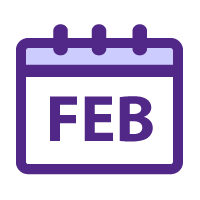 Look at the calendar! You’re shifting into second semester and life is good, right? Well, just in case you need a little cheering on–and maybe a smile or two, we’re going to provide the following stories in our next issue:
Look at the calendar! You’re shifting into second semester and life is good, right? Well, just in case you need a little cheering on–and maybe a smile or two, we’re going to provide the following stories in our next issue:
- Assessments—how you AND your students can succeed!
- Silly first-year teacher mistakes your professors made.
- Ideas for collaboration with other secondary teachers.

